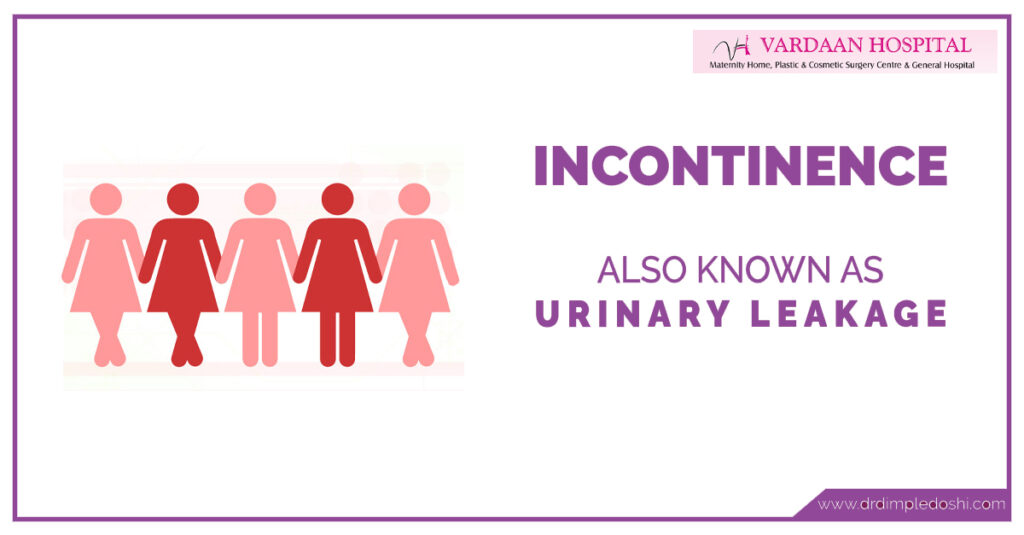Regain Confidence with Urinary Incontinence Treatment in Goregaon West, Mumbai
Urinary leakage or incontinence is a problem faced by many women; though the reported incidence is less than the actual incidence; as the majority of them shy away from discussing it. They accept it as a part of the aging process and feel it is a sign of womanhood because they have heard it from many of the elderly ladies in their families.
But no, you do not have to pay a price for being a woman. Though many times, it is not completely treatable; talking to your doctor may lead to improvement in the quality of your life.
Incontinence is just a problem in bladder control; not the end of your joys.; not the end of long traveling; not being embarrassed all the time; not being a subject of youngster’s gossip and dislikes; not being forced to stay in isolation and feeling stenchy.
Talk it out. Describe it to your doctor who will always be there by your side to help you live through such seemingly big but very minor, innocuous, and common problems. Many times; simple changes in the lifestyle or diet and few medications can treat the symptoms of urinary incontinence.

Dr. Dimple Doshi at Vardaan Hospital; believes prevention is better than cure, and thus apart from the precise treatment guidelines; preventive measures are an essential part of our consultations with the patients who have either had it or want to know more about it.
What is Urinary Incontinence
Simply speaking; urinary incontinence means the loss of bladder control. The severity of urinary incontinence ranges from occasional leak of urine while coughing or sneezing or having an urge so severe that you don’t get to a toilet in time.
Though it occurs more often as you age; urinary incontinence is not inevitable to have when you age.
When to Seek Advice for Urinary Incontinence
You must not hesitate to visit your doctor if the urinary incontinence
- Causes you to restrict your activities and limit your social interactions
- Increases the risk of fall in elderly women while rushing to the toilet.
- Indicates an underlying serious condition.
- Negatively impact the quality of life.
Causes of temporary urinary incontinence are:
Most of the women leak minor amount of occasional leaking while others lose small to moderate amounts of urine more frequently.
- Stress incontinence: Here you leak urine while coughing; sneezing; laughing; exercisiong or lifting heavy weights . So the word stress urinary incontinence. It happens due to pressure on the urinary bladder.
- Urge incontinence: Here you have an intense and sudden urge to urinate and is followed by involuntary leakage of urine.
- Overflow incontinence: Here you experience constant or frequent dribbling of urine due to a bladder that does not empty completely.
- Functional incontinence: Here some physical or mental disease prevents you to reach the toilet on time.
- Mixed incontinence: Here you may experience one or more of the above-mentioned varieties
Depending upon the cause; urinary incontinence may be temporary or persistent.
Persistent urinary incontinence causes are
- Pregnancy and child birth which leads to weakening of the muscles needed for bladder control; and prolapse where the uterus; bladder; vagina or intestines or rectum protrude down from their normal place leading to urinary incontinence.
- Aging and menopause : Aging leads to weakening of the bladder capacity and so involuntary bladder contractions become more frequent leading to leakage. Menopause leads to thinning of the lining causing urinary incontinence.
- Obstruction: Any kind of tumor or stone anywhere in the urinary tract can cause obstruction and leakage.
- Neurological diseases can cause persistent urinary incontinence.
Risk Factors for Urinary Incontinence.
- Age: Advanced age and menopause make changes in your bladder and urethra loose their strength and decrease the capacity of the bladder thus predisposing to urinary incontinence.
- Being overweight: Extra weight puts pressure on your bladder and surrounding muscles which weakens them and causes urinary incontinence.
- Smoking: Smoking and tobacco use may increase the risk of urinary incontinence.
- Family History: Your risk of developing the urge incontinence is high if any of your family members is having it.
- Some diseases like diabetes or neurological diseases may increase the risk of incontinence.
Prevention Of Vaginal Discharge Or Leukorrhea
1. Maintain safe sexual practices
2. Keep up good intimate hygiene but don’t overclean the vaginal area or douche it frequently as it disrupts the normal flora and leads to vaginitis and vaginal discharge.
3. Treat your partner and keep him infection free.
4. Live a healthy lifestyle
5. Wear cotton underwear and change it if it becomes too wet. Cotton allows your genital area to “breathe.”
6. Avoid feminine hygiene sprays, colored or perfumed toilet paper, deodorant pads or tampons, and bubble bath.
7. Prolonged use of antibiotics is associated with vaginal flora disruption. So if needed, take appropriate probiotics.
8. Keep good hygiene after sex.
9. Remove your intrauterine contraceptive device if the vaginal discharge is a frequent occurance.
10. Minimise the use of vaginal gels or lubricants.
11. After using the toilet, always wipe from front to back. This may help prevent getting bacteria from your rectal area into your vagina.
12. Avoid wearing tight pants, pantyhose, swimming suits, biking shorts, or leotards for long periods.
13. Change your laundry detergent or fabric softener if you think it may be irritating your genital area.
14. Avoid hot tubs.
15. Bathe or shower daily and pat your genital area dry.
In The End, A Small Piece Of Information About Vaginal Washes
Vulval cleaning may be useful for women with odorous vaginal discharge; and daily use of feminine wash may reduce the risk of recurrence of bacterial vaginosis. Clinical practice guidelines recommend women to us a pH balanced hypoallergenic cleansing agent for daily vulval cleansing .

